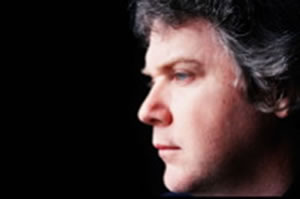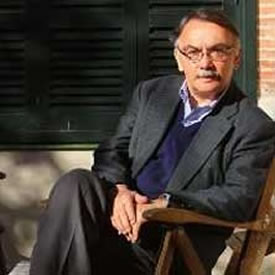De Nederlandse dichter en schrijver Joost Zwagerman werd geboren in Alkmaar op 18 november 1963. Zie ook mijn blog van 18 november 2006 en ook mijn blog van 18 november 2007 en ook mijn blog van 18 november 2008.
Uit: De Buitenvrouw
“Het gezin Rafferty was niet echt vermogend maar had toch genoeg geld om een au pair in huis te nemen. Zij kwam uit Nederland en heette Adriënne. Meneer en mevrouw Rafferty vonden haar soms wat onhandig en verward. Twee welwillende maar onnozele Oostenrijkse meisjes waren haar voorgegaan, zodat de Rafferty’s Adriënne’s kleine tekortkomingen voor lief namen.
Haar ijver en vooral haar oprechte genegenheid voor de dochtertjes Rafferty wogen ruimschoots op tegen dat kleine beetje verwarring en onhandigheid. Bovendien deelde Adriënne tot mevrouw Rafferty’s vreugde twee van haar meest dierbare liefhebberijen:lezen en spelletjes doen.
(…)
Voor Adriënne was niets vanzelfsprekend, dus ook de werkelijkheid niet. Zou ze een goede fotografe kunnen worden? Ze had geen zin meer om te luisteren. ‘De foto als metafoor.’ Ha! Zijn het niet juist metaforen – die grillige, onbeheersbare diabolo’s waarmee schrijvers, schilders en smachtende pubers lopen te goochelen- die almaar verhullen en redeloze vragen oproepen? Nee, aan Adriënne’s lijf geen kunstenmakerspolonaise. Wat ze wilde was eenvoudig: als Londen dan niet te veroveren viel kon ze nog altijd infiltreren, en de pocketcamera was haar handzaam excuus.
De cursusleider wees naar buiten.
‘Die muur daar,’ zei hij, ‘die heeft iets te zeggen. De topfotograaf ís de muur, zoals hij alles is wat hem omringt. Maar jij, meisje, jij moet om te beginnen een hele goeie vertolker, een monnik worden, a monk with a camera.’
(…)
Onwaarachtig? Ingmar Booys vertrek onwaarachtig? –
Welnu, zo verliefde mensen al werkelijk leven en zich niet bezighouden met het verlangen het bestaan van de andere voor eigen rekening te nemen, dan toch níét vlak voor en tijdens het vertrek van een van hen. Immers, beiden zijn dan enkel en alleen geconcentreerd op de ophanden zijnde scheiding; niet wordt er zoiets obligaats en terzelfder tijd onmogelijks volbracht als ‘het genieten van de laatst gedeelde momenten’, nee, iedere blik op de ander wordt geworpen om te onderzoeken. En: onderzocht wordt dan niet de pijn die rondtrekt in de ogen van andere, maar veeleer het eigen toekomstige verdriet. Ja, ook Ingmar Booy en Adriënne moesten eraan geloven; ze hadden niet langer oog voor elkaar, maar waren in plaats daarvan gespitst op de eigen, de afzonderlijke, de moedwillig afgezonderde tragiek. Slachtoffers waren ze, en als slachtoffers gedroegen ze zich:in zichzelf gekeerd, onwaarachtig en soms bijna autistisch.“

Joost Zwagerman (Alkmaar, 18 november 1963)
De Nederlandse dichter Toon Tellegen werd geboren op 18 november 1941 te Brielle. Zie ook Zie ook mijn blog van 18 november 2006 en ook mijn blog van 18 november 2007 en ook mijn blog van 18 november 2008.
Het leven
Ik kijk naar mijn leven:
het wordt kleiner
ik houd mijn ogen er vlakbij:
ik kan al niet meer onderscheiden
tussen goed en onwaarschijnlijk, tussen zien en ontwijken
tussen mij en iedereen…
wat zeg ik nu weer…
mijn leven groeit, woekert, grijpt om zich heen
en ik kan alles onderscheiden:
onraad, wansmaak en zelfs de kleinste wangedachten
ik doe mijn ogen dicht.
Mijn vader sloeg planken mis
Mijn vader
sloeg planken mis
mijn broers glimlachten,
schreven elke misslag in een schrift,
mijn moeder deed de was
of lakte haar nagels
mijn vader
die zich in leven hield met schaamte, spijt en ongemak,
die zich dagelijks gewonnen gaf,
die hijgde
en onwerkzaam en achterstallig was,
die niemand iets te vertellen had,
die een spin was zonder web en zonder lente,
die piepte en kraakte, als een ijzeren haan
op een dag sloeg hij raak
en gooiden mijn broers hem weg.

Toon Tellegen (Brielle, 18 november 1941)
De Duitse schrijver Klaus Mann werd op 18 november 1906 geboren als oudste zoon van Thomas en Katia Mann. In München. Zie ook mijn blog van 18 november 2006 en ook mijn blog van 18 november 2007. Zie ook mijn blog van 9 november 2009 en ook mijn blog van 18 november 2008.
Uit: In the Shadow of the Magic Mountain. The Erika and Klaus Mann Story (biografie door Andrea Weiss)
„Thomas and Katia got their wish for a son one year later. The boy’s christening as “Klaus Heinrich Thomas Mann” sealed his literary fate. The names Klaus and Heinrich represented Katia’s and Thomas’s closest brothers, but together the name Klaus Heinrich is also that of the prince in Royal Highness, the novel Thomas was deep in the middle of writing at the time of his son’s birth. Young Erika kindly chose for her baby brother the less burdensome sobriquet of “Eissi” (the toddler’s mispronunciation of “Klausi”), and henceforth, within the family, Eissi he would remain.
Whether or not his literary forebears had anything to do with it, Klaus seems to have been born a writer. He started writing before he could even hold a pen properly; his earliest pieces he dictated to Erika. No one, not even Klaus, was glad to learn that he had a literary bent. His family tried in vain to discourage him from writing, and he himself referred to it as the family curse. Decades after his death, Erika reflected sadly, Klaus was a dreamer. Klaus was a poet from the very beginning. And this of course was not at all what my father would have wished for his son. First of all, he knew that any child of his, if he wanted to write, would have a very hard time of it. But for Klaus, writing was as essential as breathing. Without writing Klaus simply couldn’t live.
Thomas Mann’s disappointment at the arrival of Erika and his joy at the arrival of Klaus were false starts—emotions totally at odds with the relationship he would soon forge with each. Klaus would be the source of continual disappointment to him, while Erika was the source of his greatest joy. Despite his initial preference for a son, and his declaration that “a girl is not to be taken seriously,” Thomas’s eldest and youngest daughters, Erika and Elisabeth, became his two obvious favorites, to the chagrin of the others. “When a man has six children, he can’t love them all equally,” would be his defense.
But this was a flimsy excuse for his erratic, often cruel behavior toward the remaining four. Monika, the middle daughter, claimed never to have had an intimate conversation with her father, or even to have had the feeling that she existed for him in his mind. Michael, the youngest son, recalled being beaten with a walking stick and other harsh punishments that prevented him from being able to forgive his father throughout his adult life. He was allowed to listen in on the stories his father read to his sister Elisabeth, but it was made clear that they were not meant for him. And Golo, the middle son, who grew up to become one of Germany’s most prominent essayists and historians, had not one compassionate or affectionate word for his father in his entire autobiography. In the midst of his large family Golo often felt awkward and lonely. Klaus’s callous treatment by his father was by no means unique to him.“

Klaus Mann (18 november 1906 – 21 mei 1949)
De Iers-Amerikaanse dichter Seán Mac Falls werd geboren op 18 november 1957 in Boston. Zie ook mijn blog van 18 november 2006 en ook mijn blog van 18 november 2008.
I Hear All The Outlawed World
I
I hear all the outlawed world in harmony,
The marshling stalks the green and gaunt
Destroyers who heed not sparkling deserts
Charged to the gill, nor candles pitching down
Like doom. I note the scale of fossils
In cloud covered peaks, record
The seemly count of bodies by square root
And irrational number, I am witness
Bound to bounty to all who blaze in gray
And shallow grooves seeding their ends
In strikes on the ripe and smoldering fields.
II
I see all the outlawed world in harmony,
Barking wood bracing by the bud,
Where runs of blue, bury in vain
Down slash of mountain forest, cascading
Into august, rising after the fall,
As do kind-killers blasting from shells
To die as snails creeping under flower,
Who saw the past wasting away
In filed futures, slipping by blades in neck
Of wood, sightless as gallows of trees
Try murder each time they make their leaves.
III
I know all the outlawed world in harmony,
By seamless song of stuttering gulls,
As in conches, waves of providence,
Cell from the center, beating musseled shoals,
Where wailing ghosts and wing-tips point
Printed nails to the silent capes,
And bumble hairs comb round the broken yokes
Stirring streams of babble baited
By flowering psalms, engaging arms to prey
On tales told by the rood and drown
In eyes turning like sands on the sea.

Seán Mac Falls (Boston, 18 november 1957)
De Duitse dichter Richard Dehmel werd geboren op 18 november 1863 in Wendisch-Hermsdorf. Zie ook mijn blog van 18 november 2006 en ook mijn blog van 18 november 2008.
Die stille Stadt
Liegt eine Stadt im Tale,
ein blasser Tag vergeht;
es wird nicht lange dauern mehr,
bis weder Mond noch Sterne;
nur Nacht am Himmel steht.
Von allen Bergen drücken
Nebel auf die Stadt;
es dringt kein Dach, nicht Hof noch Haus,
kein Laut aus ihrem Rauch heraus, Kaum Türme noch und Brücken,
Doch als den Wandrer graute,
da ging ein Lichtlein auf im Grund;
und durch den Rauch und Nebel
begann ein leiser Lobgesang,
aus Kindermund.
Wollust
Nach Shakespeare
In wüster Schmach Vergeudung heiliger Glut
ist Wollust, wenn sie praßt; und eh sie praßt,
roh, schamlos, tierisch, aller Welt zur Last,
meineidig, tückisch, voller Gier nach Blut.
Gesättigt kaum, von Ekel schon gehetzt;
sinnlose Lüsternheit und, kaum verraucht,
sinnlose Düsterkeit, in Wut getaucht,
als hätt ein Tollwurm die Vernunft zerfetzt.
Wahnwitz im Rausch, Wahnwitz in Wunsch und Wahl,
maßlos im Taumel vor, nach, in der Brunst,
erdürstet Überglück, genossen Dunst,
verzückt vor Wonne, dann erdrückt von Qual –
Ach! Jeder kennt und Jeder geht den Weg:
zu dieser Hölle diesen Himmelssteg.

Richard Dehmel (18 november 1863 – 9 februari 1920)
Getekend door Hans Baluschek
De Venezolaanse dichter en schrijver Eugenio Montejo werd geboren in Caracas op 18 november 1938. Zie ook mijn blog van 18 november 2008.
Left Behind
Down these streets my funeral has just passed
with its pathetic speeches.
Lightly they lifted my body
among unrecognizable relatives.
As the procession passed
a woman stopped and gazed
with flirtatious embarrassment.
Later I realized she was a shadow
already shouldering centuries under earth.
Above the clouds continued their monologues,
a slow plane barely moved in its flight;
below mourners cough, polite gestures of the crowd,
the usual phrases.
Asleep and with no sense of where I was,
I was going on the last journey.
It was my farewell to this world,
the first time that I was going to die.
Towards the end of the millennium
suddenly I found myself outside of the group,
left behind, contemplating the trees.
The funeral, without me, continued on its course
through the shady half-light of suburban streets.
I walk slowly following it now from far off
down the passage of the years
Vertaald door Peter Boyle

Eugenio Montejo (18 november 1938 – 5 juni 2008)
De Oostenrijkse dichter, schrijver en vertaler Christoph Wilhelm Aigner werd geboren op 18 november 1954 in Wels.
Landsolo
Langsamer Wind
Getreidefeld
Wimpern am schläfrigen Sommer
Alleinsein mit wem

Christoph Wilhelm Aigner (Wels, 18 november 1954)
Zie voor onderstaande schrijvers ook mijn blog van 18 november 2008.
De Belgische schrijfster Mireille Robertine Cottenjé werd geboren in Moeskroen op 18 november 1933.
De dichter en historicus Jakob (Jaap) Meijer werd geboren in Winschoten op 18 november 1912.
De Canadese schrijfster Margaret Atwood werd geboren in Ottawa op 18 november 1939.
De Engelse toneelschrijver, librettist en illustrato Sir William Schwenck Gilbert werd geboren in Londen op 18 november 1836.
